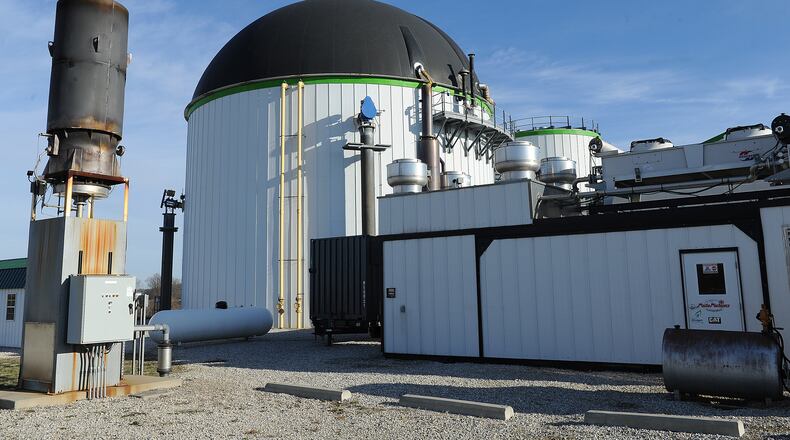The EPA has several enforcement options, according to the violation notice, including issuing an administrative compliance order, administrative penalty order, or bringing judicial civil or criminal action against the company.
The Dovetail biodigester, operated by Renergy, uses an anaerobic process to break down food waste and manure into fertilizer and methane gas for electricity in Greene County. The facility has been a source of controversy for years, as neighbors have complained of odors, and Bath Twp. officials have pursued zoning controls.
In April, Renergy settled with the state of Ohio over permit violations at its 5.5-million gallon digestate lagoon, which holds fertilizer in a storage tank after processing.
The permit application must include samplings for emissions, including ammonia, volatile organic compounds (which are organic gases that can have adverse health effects), sulfur, and methane. Renergy also is required to submit a report on the feasibility of steps to curb emissions.
Renergy submitted its initial permit application for the digestate lagoon for the Dovetail facility, and is going through the permitting process, which can take several months, chief operating officer Cari Oberfield said.
The Ohio EPA makes the final decision on what measures must be implemented.
Renergy also is the subject of a lawsuit by the city of Fairborn and Bath Twp., and a class-action lawsuit filed by township residents, both concerning emissions and odors from the facility.
Renergy declined to comment on the latest violation notice.
Recently, Bath Twp. residents and residents of Morrow County, where Emerald is located, have amped up pressure on lawmakers to tighten regulations on biodigester facilities. The Ohio Biosolids/Biodigester Coalition, comprised of residents of Bath Twp and across Ohio, have petitioned the Ohio EPA to hold public hearings on any issued or re-issued permits for any Renergy operations.
Bath Twp. trustees and residents have long argued that biodigesters exist in a “legislative loophole,” after a 2020 ruling by a Greene County judge declared the facilities a public utility, which are exempt from local zoning regulations. Additionally, state laws governing renewable energy facilities do not address anaerobic biodigesters.
In a letter to state lawmakers, the coalition wrote, “Anerobic biodigesters claim they are a green, renewable energy. If that is the case, they should be treated like any other renewable energy producers, such as solar or wind farms. We citizens, by law, deserve a seat at the table, and that is being denied.”
About the Author


